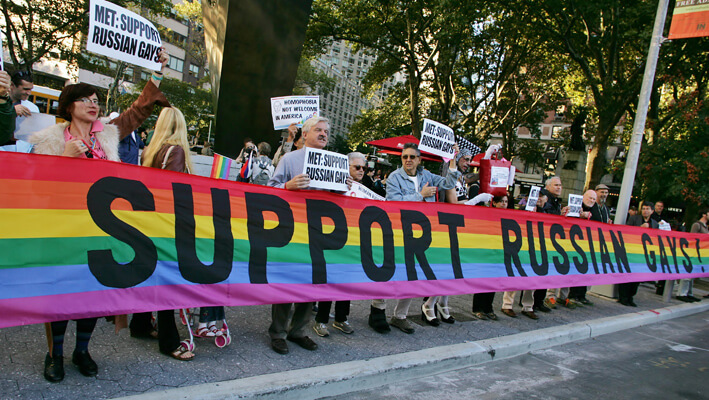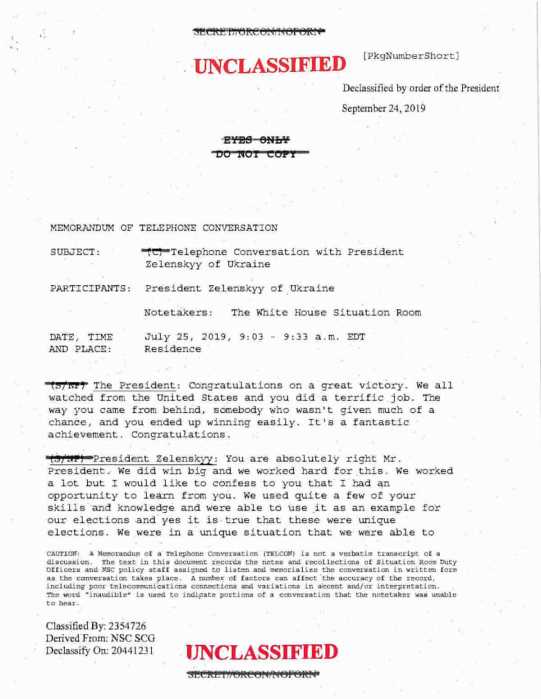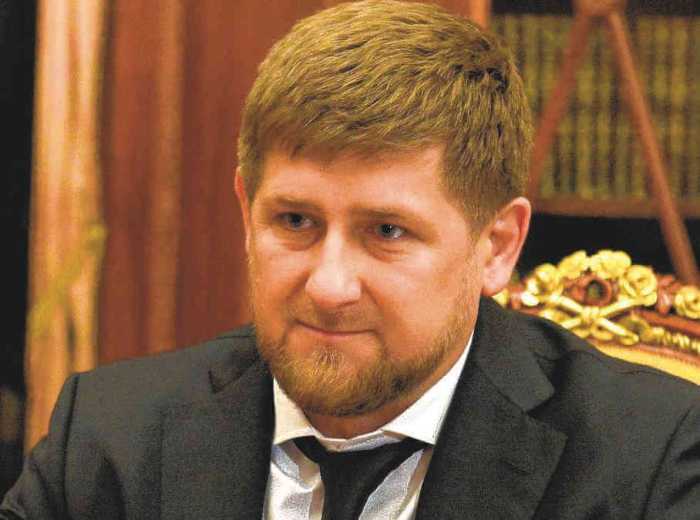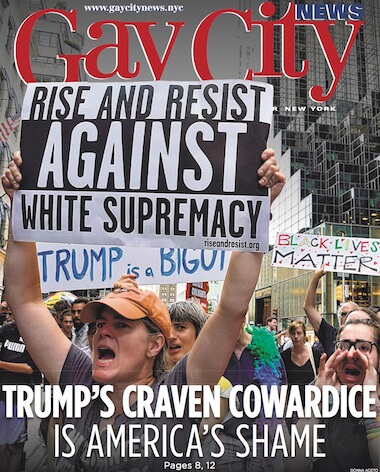New York State Comptroller Thomas DiNapoli. | ANDREW HILL/ NYS COMPTROLLER'S OFFICE
BY ANDY HUMM | Ten major Olympic sponsors from Coke to Dow Chemical –– none of which has acceded to calls that they speak out forcefully against Russia’s laws making it a crime to be gay in public –– are now being pressured by the $161 billion New York State Common Retirement Fund, led by Comptroller Thomas DiNapoli, to do that and more.
New York City Comptroller John Liu and 19 private investment firms also signed the December 3 letter, which has yet to yield a response from the sponsors of the Olympics scheduled for February in Sochi, Russia.
“The Russian government’s discriminatory laws have cast a shadow over the Olympics,” DiNapoli said in a December 5 release calling on the sponsors to “stand up for the respect and equality enshrined in the Olympic movement, advocate for human rights, and confront abuses.”
DiNapoli joined by City Comptroller Liu, 19 investment firms
DiNapoli, a Democrat, called it “not just the right thing to do, it protects shareholder interests and corporate reputations.”
Liu, also a Democrat, said, “If they fail to step up and speak out in support of equal rights for all, they risk damaging their reputations and their value to investors.”
Shelly Alpern, a director at Clean Yield Management, a signatory to the letter, said that since the Olympic Games derive 92% of their revenue from sponsorship and TV rights, they have enormous “influence over the International Olympic Committee and host countries. There is simply no justification for silence and inaction.”
The letter called on the sponsors to take three steps –– make sure that their own “nondiscrimination policies are strong, inclusive, and enforced globally,” especially for employees in Russia; tell Russia’s leaders to rescind the anti-gay laws; and tell the International Olympic Committee (IOC) “to obtain firm and express commitments from the Russian government” on the safety and rights of athletes and visitors at the Sochi Games.
The letter noted the recent protests against the inaction of the sponsors and the activist calls for boycotts of their products and services, emphasizing that taking the actions requested “will help protect your company’s brand and reputation, and, consequently, your profits and our investments.”
New York City Comptroller John Liu. | NYC COMPTROLLER'S OFFICE
The letter says, “Russia has drawn worldwide condemnation by its enactment of laws restricting the rights of LGBT citizens to free speech and assembly. These actions have cast a shadow over the competition and violate both the spirit of the Olympic Games and the Olympic Charter.” It also says, “We believe strongly that the corporations in which we invest have the opportunity to and should confront the wrongs that result from Russia’s new laws.”
The laws have whipped up an extremely anti-gay atmosphere in Russia that has led to the torture and deaths of Russians perceived to be LGBT, an intensified crackdown on any public protest by LGBT people or anyone else, and terrorist attacks on gay bars and the offices of LGBT groups. Russia has taken action to stop adoptions of Russian children in countries that permit same-sex marriage and is considering a bill to take away children from Russian gay and lesbian parents outright.
The recently concluded LGBT film festival in St. Petersburg was interrupted five times by bomb threats, and after its closing day out gay director Gus Van Sant and screenwriter Dustin Lance Black, in defiance of the new laws, unveiled a big rainbow banner outside reading “Support Russian Gays.” The banner was made by Rainbow Flag creator Gilbert Baker and brought into Russia by Black.
DiNapoli has faced calls in recent months to divest from Russia by Upper West Side Assemblyman Daniel O’Donnell, West Side State Senator Brad Hoylman, and Jackson Heights City Councilman Daniel Dromm. The three out gay Democrats praised the move by the state and city comptrollers and either dropped or weakened their calls for divestment.
“It’s a really great step,” said O’Donnell. “If others in DiNapoli’s position do the same thing, that might make the sponsors start to see their sponsorship as a bad thing, not a good thing.”
DiNapoli’s move is believed to be the first such action from a state comptroller. There is a bill in the California Legislature calling for divestment from Russia, but it has not moved.
Hoylman called it a “strong message” and said sponsors “must take action against Russia’s discriminatory laws targeting the LGBT community.” He termed their doing anything less “an abdication of their corporate social responsibility.”
Saying, “The comptroller’s action and divestment are not mutually exclusive,” Hoylman indicated he is continuing to discuss the issue with DiNapoli’s office.
Queer Nation NY, which has been out in the streets protesting the Russian laws for months now, issued a statement calling the comptrollers’ action “a small step,” adding that “if DiNapoli believes ‘strongly that the corporations in which we invest have the opportunity to and should confront the wrongs that result from Russia’s new laws’ then he should follow his own advice and immediately sell all the Russian assets held by the Common Retirement Fund. Unfortunately, DiNapoli has refused to even disclose the Russian assets held by the fund in response to a Freedom of Information request from Queer Nation.”
In response to Queer Nation, Eric Sumberg, a DiNapoli spokesman wrote in an email, “Corporate engagement is the first step in any shareholder action. Comptroller DiNapoli is the trustee of the Fund and must ensure that the interests of the members, beneficiaries, and retirees of the retirement system are paramount in any investment decision.”
Demonstrators from Queer Nation and allied groups protesting Russian President Vladimir Putin supporters who appeared at the Metropolitan Opera's gala opening in September. | SAM SPOKONY
Andre Banks, executive director of All Out, which has focused a lot of its efforts against the Russian laws on the Olympic sponsors, called the letter “a really bold and extremely important move. It sends a clear message that tacit support for Russian anti-gay laws is bad for business.”
Banks said, “ We are running a campaign targeting Coca Cola and other sponsors that is going to ramp up at the beginning of the year and through the Games at Sochi. The comptroller’s action shows increased scrutiny and public criticism is a real liability” for these sponsors. He said the response from Coke so far has been “weak.”
“They are talking to the IOC about these issues, but refuse to make an affirmative statement against the anti-gay laws,” Banks said.
The major sponsors in addition to Coke and Dow are AtoS, General Electric, Omega, McDonald’s, Panasonic, Proctor & Gamble, Samsung, and Visa. DiNapoli’s release said that their failure to speak up against the Russian laws was “not acceptable.”
Bloomberg News reported that Coca-Cola “won’t withdraw sponsorship to avoid undermining gay athletes who’ve spent years preparing for the competition. ‘A more positive impact can be made through continued involvement, rather than by sitting on the sidelines,’ Anne Moore, a spokeswoman for Coca-Cola, said by email.”
Bloomberg also reported that Omega issued a statement saying it would be “inappropriate for us to take any position that could have even the appearance of partisanship.”
Among the investors signing the DiNapoli letter were the Sisters of St. Francis of Philadelphia, the Unitarian Universalist Association, the Oneida Tribe of Indians of Wisconsin, Northstar Asset Management, Trillium Asset Management Corporation, and the Nathan Cummings Foundation.







































